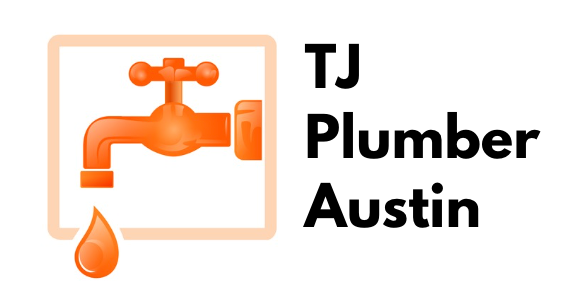Water Heater Repair – Austin, TX
SMART SOLUTIONS FOR WATER HEATER REPAIR
Repairing or water heater installation can vary in complexity depending on the issue, but here are some smart solutions that cover a range of common problems:
1. Check the Power Supply: Ensure the water heater is receiving power. Sometimes a tripped circuit breaker or a blown fuse could be the culprit. Reset the breaker or replace the fuse if necessary.
2. Inspect the Pilot Light: For gas water heaters, check if the pilot light is lit. If not, relight it following the manufacturer’s instructions. If it won’t stay lit, there might be an issue with the thermocouple.
3. Flush the Tank: Sediment buildup in the tank can reduce efficiency and cause heating problems. Regularly flushing the tank can help prevent this issue. Follow the manufacturer’s instructions for flushing.
4. Replace the Heating Element: In electric water heaters, if there’s no hot water or it’s not as hot as it should be, a faulty heating element could be the problem. Replacement kits are available and can be installed with basic tools.
5. Check for Leaks: Water leaking from the tank or around connections indicates a problem. Tighten connections or replace faulty parts such as valves or fittings.
6. Inspect the Thermostat: Incorrect thermostat settings or a malfunctioning thermostat can cause water temperature issues. Make sure it’s set correctly and consider replacing it if necessary.
7. Pressure Relief Valve Inspection: A faulty pressure relief valve can lead to leaks or even tank explosions. Test the valve to ensure it’s functioning properly, and replace it if needed.
8. Consider Professional Help: If you’re unsure about diagnosing or fixing the problem, or if it involves gas or electrical components beyond your expertise, it’s best to call a licensed plumber near me or technician.
Remember, safety should always be a priority when working with water heaters, especially those powered by gas or electricity. If you’re not comfortable or confident in your abilities, it’s best to seek professional assistance.
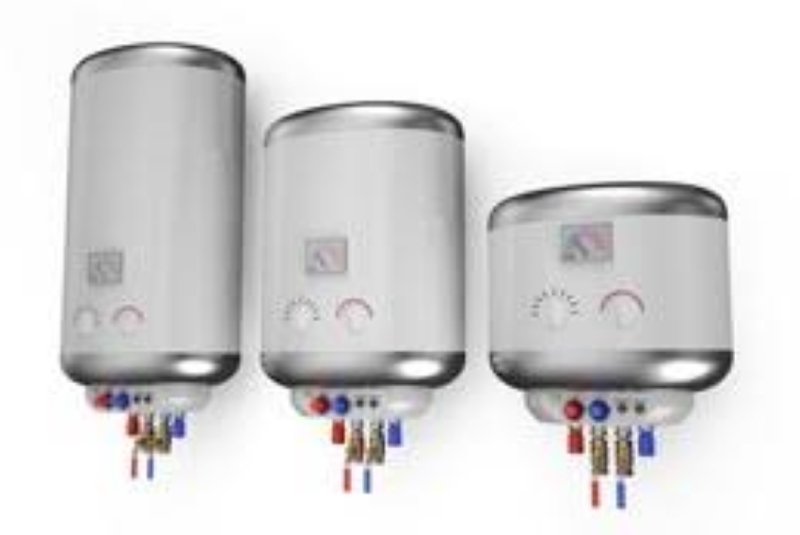
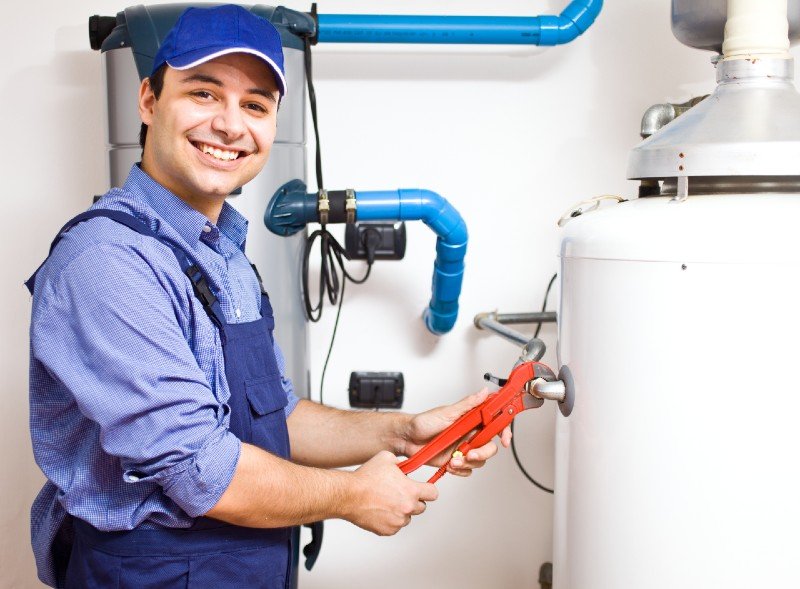
Call Now For A Free Estimate
WHAT IS THE DIFFERENCE BETWEEN A SMART WATER HEATER AND A REGULAR WATER HEATER?
A smart water heater differs from a regular water heater primarily in its connectivity and advanced features. Here’s a breakdown of the key differences:
1. Connectivity: Smart water heaters are equipped with Wi-Fi or other connectivity options that allow them to be controlled remotely through a smartphone app or a web interface. This means you can adjust settings, monitor energy usage, and receive alerts or notifications about the water heater’s status from anywhere with an internet connection. Regular water heaters typically lack this remote control capability.
2. Energy Efficiency: Smart water heaters often come with energy-saving features such as programmable schedules, energy usage monitoring, and intelligent heating algorithms. These features help optimize energy consumption and can lead to cost savings on utility bills over time. While some regular water heaters may have basic energy-saving functions, they generally don’t offer the same level of customization and optimization as smart models.
3. Diagnostic Capabilities: Smart water heaters may have built-in diagnostic tools that can detect and troubleshoot issues automatically. They can alert you to potential problems before they escalate, reducing the risk of unexpected breakdowns and costly repairs. Regular water heaters usually require manual inspection and troubleshooting by the homeowner or an emergency plumber.
4. Integration with Smart Home Systems: Smart water heaters can often be integrated into larger smart home ecosystems, allowing them to interact with other connected devices such as smart thermostats, home automation systems, or virtual assistants like Amazon Alexa or Google Assistant. This integration enables advanced features like voice control, energy optimization based on occupancy patterns, and seamless coordination with other smart devices in the home.
5. Higher Cost: Due to their advanced features and connectivity options, smart water heaters typically come with a higher upfront cost compared to regular water heaters. However, the potential energy savings, convenience, and peace of mind they offer may justify the additional investment for some homeowners.
In summary, while both smart and regular water heaters perform the basic function of heating water for household use, smart water heaters offer enhanced connectivity, energy efficiency, diagnostic capabilities, integration with smart home systems, and convenience, albeit at a higher cost.
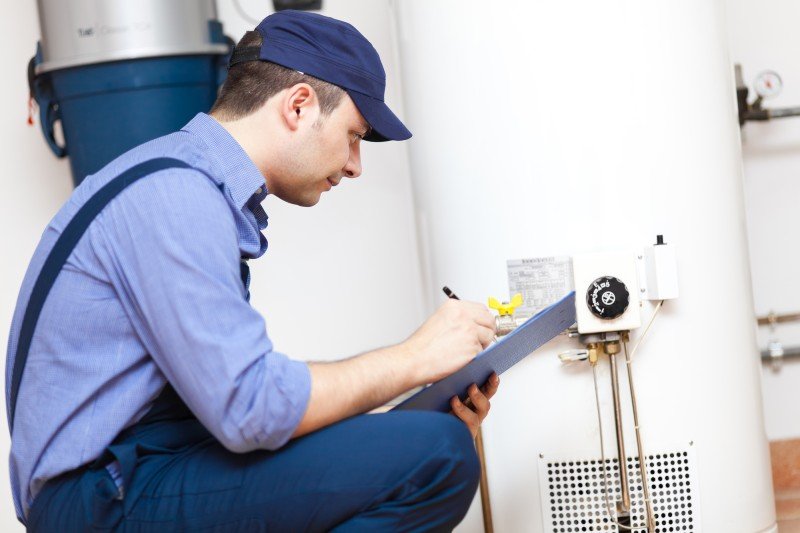
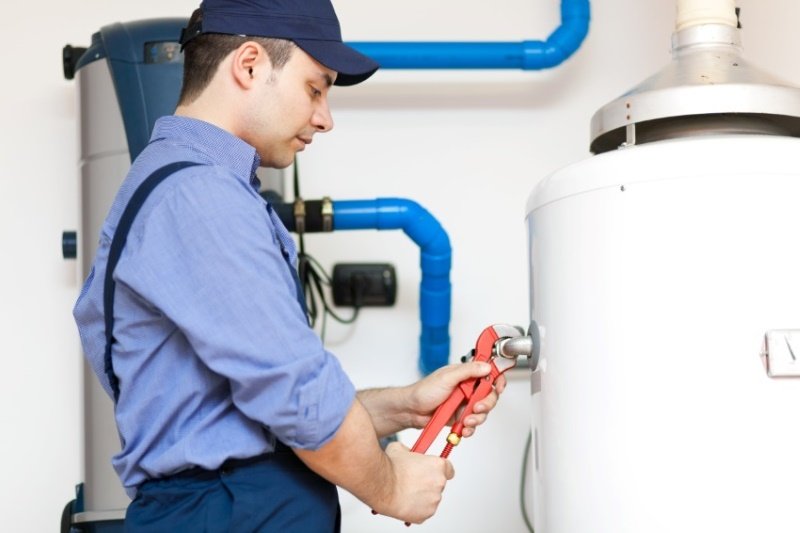
Call Now For A Free Consultation
ECO-FRIENDLY OPTIONS FOR WATER HEATER REPAIR
1. Tankless Water Heaters: Tankless, or on-demand, water heaters only heat water as it’s needed, eliminating the standby energy losses associated with traditional tank-style water heaters. They can be powered by electricity, natural gas, or propane, and they typically have a longer lifespan than conventional water heaters. Opting for a tankless water heater can significantly reduce energy consumption and lower carbon emissions.
2. Heat Pump Water Heaters: Heat pump water heaters use electricity to move heat from one place to another instead of generating heat directly, making them highly energy-efficient. They extract heat from the surrounding air and transfer it to the water in the tank. While they may have a higher upfront cost compared to conventional water heaters, they can save significant energy and money over their lifespan.
3. Solar Water Heaters: Solar water heaters utilize renewable energy from the sun to heat water, reducing reliance on fossil fuels and lowering carbon emissions. They consist of solar collectors mounted on the roof or in a sunny area and a storage tank. While they require ample sunlight to operate efficiently, they can provide substantial energy savings over time, especially in sunny regions.
4. Energy-Efficient Gas Water Heaters: If you prefer a gas water heater, choose a model with high energy efficiency ratings, such as ENERGY STAR certified units. Look for features like improved insulation, advanced combustion technology, and electronic ignition systems to minimize energy waste and maximize efficiency.
5. Insulation and Maintenance: Improving the insulation around your water heater and hot water pipes can help retain heat and reduce standby heat loss, improving overall energy efficiency. Additionally, regular maintenance, such as flushing the tank to remove sediment buildup and checking for leaks or inefficiencies, can ensure optimal performance and longevity of the water heater.
6. Smart Controls and Timers: Installing smart controls or timers on your water heater can help optimize energy usage by allowing you to schedule heating times based on your household’s hot water needs. This can prevent unnecessary heating during periods of low demand and reduce energy consumption.
By choosing eco-friendly options for water heater repair or replacement and adopting energy-saving practices, you can minimize your environmental footprint and contribute to a more sustainable future while enjoying the benefits of reliable hot water supply.
Got Questions? Call Now To Get Answers
TYPES OF WATER HEATER REPAIR
Water heater repair can encompass various issues, ranging from minor adjustments to major component replacements. Here are some common types of water heater repair:
1. Thermostat Replacement: If your water heater is not producing hot water or the temperature is inconsistent, a faulty thermostat could be the culprit. Replacing the thermostat can restore proper temperature control and prevent the water heater replacement.
2. Heating Element Replacement: In electric water heaters, heating elements can wear out over time, resulting in insufficient heating or no hot water at all. Replacing the heating element can solve this issue.
3. Pilot Light Repair: For gas water heaters, if the pilot light won’t stay lit or goes out frequently, there may be a problem with the thermocouple, gas valve, or pilot assembly that requires repair or replacement.
4. Anode Rod Replacement: Anode rods are sacrificial components that protect the tank from corrosion by attracting corrosive elements in the water. If the anode rod becomes depleted or corroded, replacing it can extend the lifespan of the water heater.
5. Pressure Relief Valve Replacement: A malfunctioning pressure relief valve can lead to pressure buildup inside the tank, posing a safety risk. If the valve is leaking or not operating properly, it should be replaced promptly.
6. Sediment Flushing: Sediment buildup inside the tank can reduce heating efficiency and lead to premature failure. Flushing the tank to remove sediment can improve performance and extend the lifespan of the water heater.
7. Leak Repair: Water leaks from the tank, fittings, or connections should be addressed promptly to prevent water damage and mold growth. Tightening connections, replacing faulty parts, or repairing corrosion damage can resolve leaks.
8. Insulation Repair: If the insulation around the tank or pipes is damaged or deteriorated, it should be repaired or replaced to prevent heat loss and improve energy efficiency.
9. Expansion Tank Replacement: In closed-loop plumbing systems, expansion tanks help regulate water pressure and prevent damage to the water heater. If the expansion tank is leaking or not functioning properly, it may need to be replaced.
10. Gas Control Valve Replacement: If your gas water heater is experiencing issues with gas flow or ignition, the gas control valve may need to be replaced by a qualified technician.
These are just a few examples of the types of water heater repairs that may be necessary to address various issues. Depending on the specific problem, repair techniques and parts may vary, so it’s essential to diagnose the issue accurately before attempting repairs. If you’re unsure or uncomfortable with DIY repairs, it’s best to call an emergency plumber near me.
CAN A TANKLESS WATER HEATERS BE REPAIR?
1. Mineral Buildup: Over time, minerals in the water supply can accumulate inside the heat exchanger or other components, leading to reduced efficiency or performance issues. Flushing the system to remove mineral deposits can often resolve this issue.
2. Flame Failure: Gas-powered tankless water heaters rely on a steady flame to heat water. If the flame goes out or fails to ignite, there may be an issue with the gas supply, igniter, gas valve, or venting. These components may need to be inspected and repaired or replaced as necessary.
3. Scale Buildup: In areas with hard water, scale buildup can occur inside the heat exchanger, restricting water flow and reducing heating efficiency. Descaling the heat exchanger with a descaling solution can help restore optimal performance.
4. Temperature Fluctuations: If you’re experiencing fluctuations in water temperature or inconsistent hot water flow, there may be a problem with the flow sensor, temperature sensors, or electronic control board. Troubleshooting and repairing or replacing these components can help stabilize water temperature and flow.
5. Leaks: Leaks can occur in the plumbing connections, valves, or internal components of a tankless water heater. Identifying and repairing the source of the leak is essential to prevent water damage and maintain proper operation.
6. Error Codes: Many tankless water heaters are equipped with diagnostic systems that display error codes to indicate specific problems. Understanding these error codes and addressing the underlying issues can often resolve performance issues or malfunctions.
While some tankless water heater repairs can be performed by homeowners with basic plumbing skills and the right tools, more complex issues may require professional assistance from a licensed plumber or technician. Regular maintenance, such as flushing the system, inspecting components, and addressing minor issues promptly, can help prevent larger problems and prolong the lifespan of your tankless water heater.
TJ PLUMBER AUSTIN
3605 Thompson St, Austin, TX 78702
Hours of Operation
Mon Open 24 hours
Tue Open 24 hours
Wed Open 24 hours
Thu Open 24 hours
Fri Open 24 hours
Sat Open 24 hours
Sun Open 24 hours
